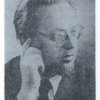Originally baptised in the Roman Catholic faith, after the death of his parents, he was converted to Holy Orthodoxy under Bishop Gorazd, Bishop of the Orthodox Diocese in Czechoslovakia. The conversion took place in the Vrdnik Monastery of Ravanica at the hands of Fr. Makarije Djordjevic.
After elementary school, Emilian became a student of the Serbian Orthodox Seminary in Sarajevo from 1923 to 1928. Having graduated from the Seminary, he undertook post-graduate theological studies at the University of Belgrade, from 1929 to 1934.
In 1930, Emilian married a Serbian girl, Bosiljka Parlaceva, in the Cathedral Church of Sremski Karlovci.
On March 16, 1930, he was ordained to the Holy Diaconate at the St. Nicholas Cathedral by Dr. Irinej (Djordjevic), the Vicar-bishop of Belgrade-Karlovci. On March 23,1930, he was ordained to the Holy Priesthood.
Fr. Emilian's first parish was in Vitojevci, a village in Srem, and later in Dalj, Vojvodina. While serving the Dalj parish, Father Emilian became very active in the "Religious Movement" — "Bogomoljacki Pokret" — as it was headed by Bishop Nicholai (Velimirovich). He worked very closely with Bishop Nicholai, wrote many important articles in "Svetosavlje," and was regarded as a dynamic preacher.
In 1939, Fr. Emilian was sent by the Serbian Orthodox Church to the United States. His first parish was in Cleveland, Ohio. In 1943, he was transfered to Akron, Ohio, where he served for the following 20 years. In 1956, Fr. Emilian was promoted to the rank of Archpriest by the then ruling Bishop. However, that same Bishop very unjustly suspended Fr. Emilian and deprived him of any parish in the Serbian Orthodox Church.
In 1963,he was received into the Russian Metropolia in Northern America by Archbishop John of Chicago and Minneapolis and assigned to the small parish of St. John in Huron - Lublin, Wisconsin. In this parish Fr. Emilian served for 18 years.
In 1979, Fr. Emilian returned to St. Sava Serbian Orthodox Monastery in Libertyville, Illinois where he stayed for a short while. When asked to help a small Russian parish in Madison, Wisconsin, he accepted the invitation and served there for over a year. Finally, he returned to his beloved St. Sava Monastery at the invitation of his life-long friend, Bishop Firmilian.
On the Sunday of the Prodigal Son, Fr. Emilian preached at the Monastery Church, during the Divine Liturgy, on the Gospel theme of "Returning to the Father. "He commented how he, as any earthly father, in the image of God the Father, "constantly lays awake past midnight, awaiting to hear the footsteps of his children returning home to their father." Fr. Emilian passed away that same evening of a sudden heart attack in the Diocesan house and quietly returned to his Father in heaven.
Fr. Emilian as a writer
Fr. Emilian was a gifted writer and author. Many of his works have been internationally recognized.
As a student of the Theological Faculty in Belgrade, he was awarded for his two writings: "Prophet Isaiah," in 1931 and "The Philosophy of Vladimir Solovyev" in 1932.
In 1936, his novel, "From Spring to Spring," received a literature prize in Prauge, Czechoslovakia.
In 1937, Fr. Emilian published his "Zatva Sermons" in the Serbian language.
In 1940, his novel "Frushka Gora" received first place in literary competition in Prague. At the time of its acclaim, the Czech critics commented how this is a novel "written with the greatest of love and admiration for the Serbian people." This novel has also been translated into English, and awaits publication, under the title of "Monastery Hills."
"Rebelija," a historical novel received a national literary prize from the European Literary Club of Prague.
In 1944, Fr. Emilian published in English a novel entitled "Man from the Balkans," a novel about the lifestyles of first generation immigrants to the United States from Slavic countries, who lacking information and assistance in application for citizenship, were after forty years here still considered enemy aliens at the outbreak of World War II.
A story about Yugoslavia written by Fr. Emilian appears in an anthology of short stories by authors of various countries, including America's Pearl Buck. It is called "Youth Replies."
Fr. Emilian as a painter - iconographer
Fr. Emilian has been painting since the age of 4. Those who are competent to pass adaquate judgement on his works, have the following to say:
"Although his work is Impressionistic, the subject is usually easy to recognize. His work is, however, set apart from true realism by his imaginative use of color. His richly appliedpaint and boldly moulded floral canvases evoke the work of Monticelli, the masterful flower painter who inspired and influenced Van Gogh to produce his radiant flower paintings."
"His canvases of cities and cathedrals deal primarily with the peasant village which is usually situated on a hill in the midst of the countryside. It gives one the impression that the people who live there have a great communion with their land and their own village which revolves around the church. The Gothic churches which frequently occupy the whole of a picture are impressionistic and reminiscent of the tradition of Manet, Cezanne and Monet."
As an iconographer, Fr. Emilian has painted an iconostasis in the Serbian Orthodox Church of St. Archangel Michael in Hibbing, Minnesota and one in the Russian Orthodox Church of St. Mary in Lublin, Wisconsin. He has also left behind him a legacy of expressionistic iconic paintings in numerous private collections.
"One can glean from his works much of the Slavic culture, the typical pathos and deep concern of a heritage mingling East and West into a tradition all its own. His icons, pietas and portrayals of Christ, tell the story of Christianity as a whole as well as the particular interpretation of this religion."
May the memory of Fr. Emilian Glocar, through his many contributions, live forever.
Bishop Irinej (Dobrijević)
[Mirko Dobrijević, Calendar of the Serbian Orthodox Church in the United States of America and Canada, 1986]
Links:
- Discussion Board for Fr. Emilian Glocar
- The Church in Hibbing, Minnesota where Fr. Emilian Glocar painted iconostasis shortly before he died:
![]()





